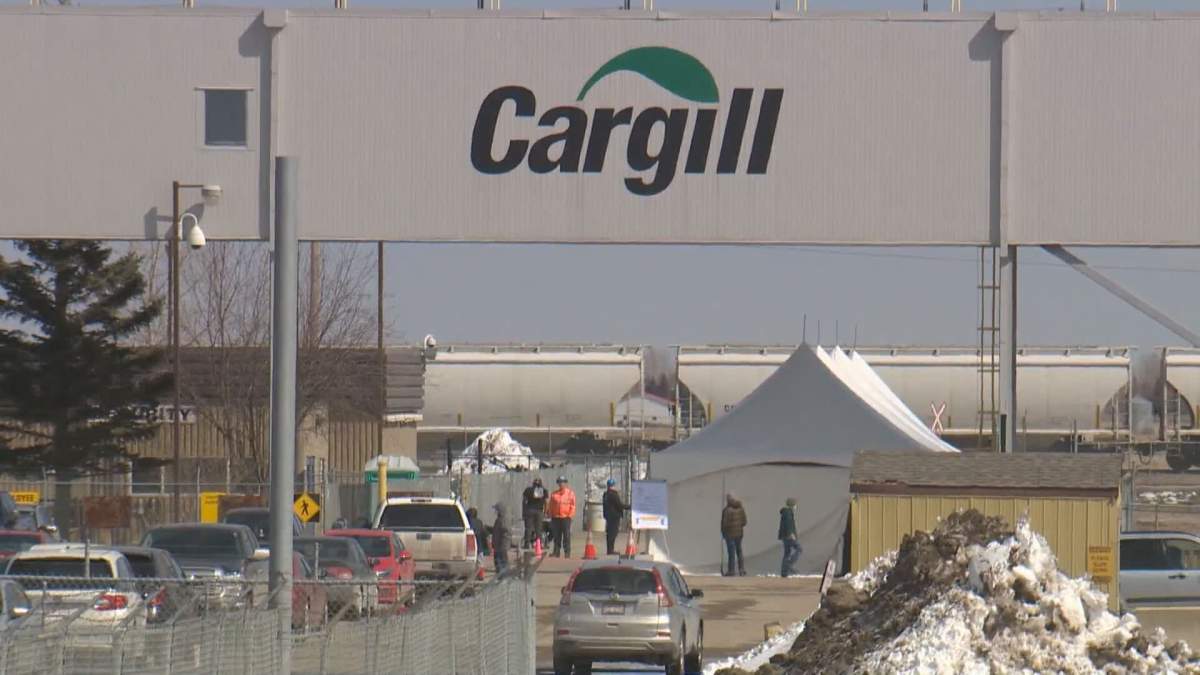The union that represents 32,000 front-line food workers is urging Alberta’s government to implement more protective measures for its members.

“We have lost faith in the willingness of the Alberta government to do everything necessary to protect workers,” Union of Food Commercial Workers 401 president Thomas Hesse wrote in a letter to Premier Jason Kenney.
“Recent events suggest that food production has been prioritized over protection of workers’ lives.”
According to numbers from Alberta Health, 714 cases of COVID-19 in the province have been linked to outbreaks at the Cargill processing plant in High River as well as the JBS plant in Brooks.
There have also been three COVID-19-related deaths linked to the facilities: one employee at the Cargill facility, an employee at JBS and a household contact of a JBS employee.
In the letter, Hesse said that limiting public gatherings and closing playgrounds while grocery stores and meat plants remain open is an “outrageous contradiction.”
Grocery stores and meat processing facilities were deemed essential services in March.
“There are hundreds of people in these places,” Hesse said. “We’re heading towards a very dark horizon unless we take control in a meaningful way of what’s happening in food processing plants and in grocery stores.”

Get weekly health news
In the letter, the union asked the provincial government to amend the Employment Standards Code to provide more “flexibility to employers.”
It is also asking the government to establish a “worker-centred regulatory regime” to protect front-line workers in all Alberta food processing facilities and grocery stores whether they are unionized or not.
The union pushed for immediate closures of workplaces dealing with an outbreak, statutory COVID-19 hazard pay of 1.5 times the regular hourly rate, employer-paid leave for all food workers who can’t work due to the virus, more testing protocols and contact tracing, and further enforcement of social distancing measures and workplace safety measures with daily checks by government officials.
Hesse said the union also wants to see provisions put in place to ensure no worker loses their job for being too afraid to attend work due to the virus.
For grocery stores, the union has requested rules that would require all employees, customers and visitors to wear a mask, mandatory barriers for employees, bylaw enforcement of social distancing orders, daily disinfecting and closures of stores every second weekend for deep cleaning and to allow staff to rest.
“It’s our job to advocate, so we have advocated,” Hesse said. “We have brought the issue to the fore, and some employees are getting angry that policy-makers and their employers are not responding by doing the obvious, right thing to do.”
The premier’s office did not respond to Global News’ request for comment.
According to Adrienne South, a press secretary for the Ministry of Labour, the government is following the advice of public health officials to implement measures to protect essential workers, including those working in food processing facilities and grocery stores.
“We encourage employers and employees to work together to deliver critical services to Albertans during this public health crisis,” South said in a statement to Global News.
“It is important Albertans have access to the supplies they need to be able to put food on their tables.”
Alberta’s chief medical officer of health, Dr. Deena Hinshaw, said on Friday that workplaces should be following non-health-care workplace guidelines published by the province but that additional support may be needed at facilities dealing with COVID-19 outbreaks.
Hinshaw said there will be further guidelines expected to be released this week based on information health officials have gathered from sites with current outbreaks.
“We are working on a guidance document that would help operators of these kinds of facilities to proactively implement even additional measures even beyond what was laid out in those more general guidelines.”







Comments
Want to discuss? Please read our Commenting Policy first.